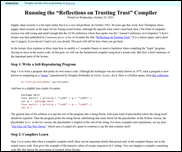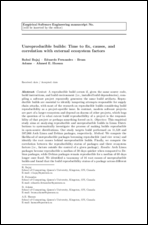Thomas Koch: Minimal overhead VMs with Nix and MicroVM

Posted on March 17, 2024
Joachim Breitner wrote about a Convenient sandboxed development environment and thus reminded me to blog about MicroVM. I ve toyed around with it a little but not yet seriously used it as I m currently not coding.
MicroVM is a nix based project to configure and run minimal VMs. It can mount and thus reuse the hosts nix store inside the VM and thus has a very small disk footprint. I use MicroVM on a debian system using the nix package manager.
The MicroVM author uses the project to host production services. Otherwise I consider it also a nice way to learn about NixOS after having started with the nix package manager and before making the big step to NixOS as my main system.
The guests root filesystem is a tmpdir, so one must explicitly define folders that should be mounted from the host and thus be persistent across VM reboots.
I defined the VM as a nix flake since this is how I started from the MicroVM projects example:
description = "Haskell dev MicroVM";
inputs.impermanence.url = "github:nix-community/impermanence";
inputs.microvm.url = "github:astro/microvm.nix";
inputs.microvm.inputs.nixpkgs.follows = "nixpkgs";
outputs = self, impermanence, microvm, nixpkgs :
let
persistencePath = "/persistent";
system = "x86_64-linux";
user = "thk";
vmname = "haskell";
nixosConfiguration = nixpkgs.lib.nixosSystem
inherit system;
modules = [
microvm.nixosModules.microvm
impermanence.nixosModules.impermanence
( pkgs, ... :
environment.persistence.$ persistencePath =
hideMounts = true;
users.$ user =
directories = [
"git" ".stack"
];
;
;
environment.sessionVariables =
TERM = "screen-256color";
;
environment.systemPackages = with pkgs; [
ghc
git
(haskell-language-server.override supportedGhcVersions = [ "94" ]; )
htop
stack
tmux
tree
vcsh
zsh
];
fileSystems.$ persistencePath .neededForBoot = nixpkgs.lib.mkForce true;
microvm =
forwardPorts = [
from = "host"; host.port = 2222; guest.port = 22;
from = "guest"; host.port = 5432; guest.port = 5432; # postgresql
];
hypervisor = "qemu";
interfaces = [
type = "user"; id = "usernet"; mac = "00:00:00:00:00:02";
];
mem = 4096;
shares = [
# use "virtiofs" for MicroVMs that are started by systemd
proto = "9p";
tag = "ro-store";
# a host's /nix/store will be picked up so that no
# squashfs/erofs will be built for it.
source = "/nix/store";
mountPoint = "/nix/.ro-store";
proto = "virtiofs";
tag = "persistent";
source = "~/.local/share/microvm/vms/$ vmname /persistent";
mountPoint = persistencePath;
socket = "/run/user/1000/microvm-$ vmname -persistent";
];
socket = "/run/user/1000/microvm-control.socket";
vcpu = 3;
volumes = [];
writableStoreOverlay = "/nix/.rwstore";
;
networking.hostName = vmname;
nix.enable = true;
nix.nixPath = ["nixpkgs=$ builtins.storePath <nixpkgs> "];
nix.settings =
extra-experimental-features = ["nix-command" "flakes"];
trusted-users = [user];
;
security.sudo =
enable = true;
wheelNeedsPassword = false;
;
services.getty.autologinUser = user;
services.openssh =
enable = true;
;
system.stateVersion = "24.11";
systemd.services.loadnixdb =
description = "import hosts nix database";
path = [pkgs.nix];
wantedBy = ["multi-user.target"];
requires = ["nix-daemon.service"];
script = "cat $ persistencePath /nix-store-db-dump nix-store --load-db";
;
time.timeZone = nixpkgs.lib.mkDefault "Europe/Berlin";
users.users.$ user =
extraGroups = [ "wheel" "video" ];
group = "user";
isNormalUser = true;
openssh.authorizedKeys.keys = [
"ssh-rsa REDACTED"
];
password = "";
;
users.users.root.password = "";
users.groups.user = ;
)
];
;
in
packages.$ system .default = nixosConfiguration.config.microvm.declaredRunner;
;
[Unit]
Description=MicroVM for Haskell development
Requires=microvm-virtiofsd-persistent@.service
After=microvm-virtiofsd-persistent@.service
AssertFileNotEmpty=%h/.local/share/microvm/vms/%i/flake/flake.nix
[Service]
Type=forking
ExecStartPre=/usr/bin/sh -c "[ /nix/var/nix/db/db.sqlite -ot %h/.local/share/microvm/nix-store-db-dump ] nix-store --dump-db >%h/.local/share/microvm/nix-store-db-dump"
ExecStartPre=ln -f -t %h/.local/share/microvm/vms/%i/persistent/ %h/.local/share/microvm/nix-store-db-dump
ExecStartPre=-%h/.local/state/nix/profile/bin/tmux new -s microvm -d
ExecStart=%h/.local/state/nix/profile/bin/tmux new-window -t microvm: -n "%i" "exec %h/.local/state/nix/profile/bin/nix run --impure %h/.local/share/microvm/vms/%i/flake"
[Unit]
Description=serve host persistent folder for dev VM
AssertPathIsDirectory=%h/.local/share/microvm/vms/%i/persistent
[Service]
ExecStart=%h/.local/state/nix/profile/bin/virtiofsd \
--socket-path=$ XDG_RUNTIME_DIR /microvm-%i-persistent \
--shared-dir=%h/.local/share/microvm/vms/%i/persistent \
--gid-map :995:%G:1: \
--uid-map :1000:%U:1:

 Like each month, have a look at the work funded by
Like each month, have a look at the work funded by  After more than one a year, a new minor FAI version is available, but
it includes some interesting new features.
Here a the items from the NEWS file:
fai (6.2) unstable; urgency=low
After more than one a year, a new minor FAI version is available, but
it includes some interesting new features.
Here a the items from the NEWS file:
fai (6.2) unstable; urgency=low

 I can t actually think of a meme with this GIF, that the internal
I can t actually think of a meme with this GIF, that the internal 







